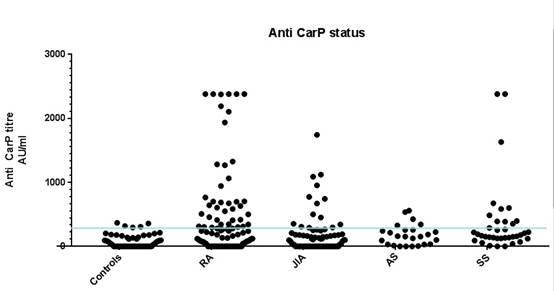Session Information
Date: Monday, November 14, 2016
Title: Rheumatoid Arthritis – Clinical Aspects - Poster II: Co-morbidities and Complications
Session Type: ACR Poster Session B
Session Time: 9:00AM-11:00AM
Background/Purpose: Antibodies targeting carbamylated proteins (Anti-CarP) have been recently described in Rheumatoid Arthritis (RA) and are reported to be associated with increased disease activity and with more severe joint damage. The specificity of the antibodies has been debated due to the fact that they are present in other rheumatic conditions. The aim of this study was to assess the presence of anti-CarP in RA patients from the CAP48 early arthritis Belgian cohort, as well as established RA patients regularly followed in our department, compare them to healthy subjects and controls from other rheumatic diseases and evaluate the specificity, sensitivity and diagnostic values of the Anti-CarP antibodies.
Methods: We tested sera from a total of 103 RA patients (38 early RA and 65 established RA), classified using the ACR/EULAR 2010 criteria for RA, healthy controls (n=56) as well as 142 patients with different rheumatic conditions (Juvenile Idiopathic Arthritis (n=80), Ankylosing Spondylitis (n=25) and Sjögren’s Syndrome (n=37)). Sera were obtained from the CAP48 Early Arthritis cohort and from the biobank of the Rheumatology department of Erasme Hospital. An in-house ELISA technique, as described previously by Shi et al, was used to determine the presence of IgG class antibodies against carbamylated Fetal Calf Serum. A cut off for positive response was established as the mean plus two SD of the anti-CarP reactivity of the healthy controls.
Results: In our RA patients, Anti-CarP were detected in 38 patients (37%), while 66 patients (66%) were positive for Rheumatoid Factor and 68 (68%) patients were positive for ACPA. Anti-CarP were also found in 4 patients (4%) seronegative for both RF and ACPA. In the control population, 5 healthy controls were positive, along with 12 JIA patients, 5 SA patients and 11 Sjögren Syndrome Patients. (figure 1) The sensitivity of the anti-CarP antibodies at the cut-off chosen was at 35% and the specificity at 92,8%. Overall, the Positive Predictive value of the antibodies was estimated at 88,4%, whereas the Negative Predictive value was 44%.
Conclusion: Anti-CarP antibodies were detected in the sera of RA patients in a Belgian cohort, including a subgroup of patients seronegative for ACPA and RF. The anti-CarP are not exclusive to RA, our study confirms their presence in other rheumatic diseases (JIA, Sjogren’s, Ankylosing Spondylitis). Whether this reactivity can be attributed to other interfering antibodies present in the sera of the controls or whether it is predictive of a particular articular phenotype remains to be elucidated. 
Fig 1. : Horizontal line represents the cut-off value.
To cite this abstract in AMA style:
Sidiras P, La C, Lauwerys BR, Durez P, Spruyt D, Rasschaert J, Sokolova T, Meric de Bellefon L, Kleimberg S, Tant L, Soyfoo M, Badot V. Antibodies Against Carbamylated Proteins in Belgian RA Patients and in Other Rheumatic Diseases [abstract]. Arthritis Rheumatol. 2016; 68 (suppl 10). https://acrabstracts.org/abstract/antibodies-against-carbamylated-proteins-in-belgian-ra-patients-and-in-other-rheumatic-diseases/. Accessed .« Back to 2016 ACR/ARHP Annual Meeting
ACR Meeting Abstracts - https://acrabstracts.org/abstract/antibodies-against-carbamylated-proteins-in-belgian-ra-patients-and-in-other-rheumatic-diseases/
